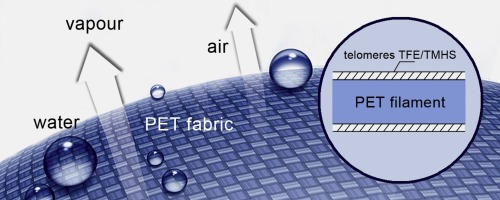Polyester may be found in many of the items you wear every day. It is used to create a wide range of fabrics, as well as to combine with other natural and synthetic fibres.
Polyester’s characteristics and how it is made, influences whether it is used in the winter or in the summer.
It is one of the most commonly used clothing fabrics today. It’s a low-cost material that’s ideal for mass-producing clothes, bags and shoes.
Usually polyester is known as a winter fabric rather than a summer one, because of its ability to retain heat. It is a non-absorbent fabric that keeps you warm during winters.

A jacket that is made of 100% polyester is undoubtedly warm as the non-porous nature of polyester will not let air pass through it keeping your body warm. It does not breathe as well as natural fibres, so your body heat is trapped which keeps you warm and cozy.
While pure polyester fabrics are ideal for winters, they are definitely not suitable for summers or humid days.
How does polyester keep you warm?
Polyester has a very tight weave. There are no escape routes for your body heat when that tight weave is turned into clothes. Your body heat sticks near to you and protects you from cold freezing air.
Also, it does not wick moisture or perspiration away from the body. The fabric’s tight weave also keeps heat contained inside. As a result, it will keep you warm for a longer period of time.
However, because one of the primary properties of polyester is heat retention, it is not a breathable material.
While this makes it suitable for outdoor items and the exterior layer of clothes, it is not suitable for the inside layer of clothing.
While 100% polyester jackets are ideal for winter, you have to remember that polyester is a non-porous material which does not allow your skin to breathe.
Therefore, many articles of clothing are constructed from a blend of polyester and another breathable fabric. Cotton and polyester blends are sometimes used to offer clothes breathability while also retaining heat.
Reasons why jackets made of 100% polyester are good
1.) Durability and resilience- Polyester fibres have excellent resistance to a variety of mild and strong acids at room temperature, and excellent resistance to solvents, even those that would normally destroy other fabrics.
Also, soaps and detergents have no negative effects on polyester, which is why they are so easy to clean.
Polyester is also highly resistant to sunlight, and it does not fade as a result of it. This is an excellent feature for jackets that spend a significant amount of time in the sun.
2.) It does not wrinkle easily- It is an anti-wrinkling material that does not easily wrinkle or lose its form with frequent wear and wash. It is well-known for its ability to retain its shape, owing to the fact that it is not a flexible material.
3.) Polyesters are hydrophobic in nature- One of the major characteristics of polyester fabric is its ability to wick moisture, which is why it is utilised in high-performance jackets designed for sports and intense physical activities.

Because of their hydrophobic nature, the fibres absorb very little moisture, allowing it to pass through the fibres and move out of the jacket.
4.) Resistance to uncertain weather- Weather resistance is also slightly higher in polyester fibres than in nylon fibres, owing to the fibres’ intolerance for water. They are less prone to wet out and can withstand rain better.
See also: Best Waterproof Work Jacket for Men and Women
Disadvantages of 100% polyester jackets-
1.) The primary disadvantage of synthetic fabrics like polyester is that they do not breathe. When wearing pure polyester jackets, some people experience sweating and dampness, which can be uncomfortable. This is due to polyester’s reduced moisture absorption when compared to natural fabrics such as cotton.
2.) People with extremely sensitive skin may experience a little irritation when wearing synthetic materials; however, this is less likely when the fabric is mixed.
3.) Pure polyester is very flammable, therefore use caution while wearing or using 100% polyester near an open flame. That means, your polyester jacket is not a good ideal for campfires and bonfires.
Polyester with other fabrics
Polyester does have its set of advantages. However, 100% polyester is not breathable though it is very resilient. That is why polyester is blended with other fabrics such as cotton and wool to minimize the disadvantages and bring out the best in it.
Polyester with cotton- Polyester and cotton are two of the most popular fabrics used in both apparel and outdoor clothing.
Cotton is a natural fabric derived from cotton plants, whereas polyester is a synthetic substance. Both of these fabrics have unique properties that make them appropriate for a variety of uses.
Cotton has a significant benefit over polyester in that it is a breathable material. Because of the tight weave of polyester, it is warm yet not breathable.
While polyester has a disadvantage in terms of breathability, it is this feature that allows it to keep you warm.
Polyester blended with cotton will make the fabric breathable and resilient bringing in both the benefits of cotton and polyester and minimizing the disadvantages of both fabrics.
Cotton and polyester are occasionally combined to make a fabric known as polycotton. A jacket made of this combination provides the benefits of both fabrics.
It is water-resistant and cozy while remaining breathable. It is also a durable, non-shrinking material that is reasonably priced.
Polyester with wool- Moisture-wicking, improved breathing, and increased warmth are some of the primary advantages of wearing a wool and polyester blend jacket.
Polyester provides wrinkle and shrink resistance to jackets while keeping a nice crease, whereas wool provides antibacterial protection as well as warmth, drape, and breathability.
The polyester then strengthens the wool. The mixes will produce a better texture and feel, as well as lower the cost of the clothing item.
See also: Is Wool Warmer Than Polyester?
Why you need a high quality Jacket?
Jackets that are of good quality protect you from external elements. As a result, the perfect jacket is one that will take you anywhere you need to go without an ounce of worry.
If you’re someone who likes adventures, a good jacket can be your best friend as it provides you with shelter, comforts you in the most isolated locations on the planet.
Any type of environment, from freezing snowy climate to lush green forests, your jacket should be able to take anything you throw at it, going where you go quietly, comfortably, and without a fuss, all while keeping you warm, cold, dry and comfortable.
What are the qualities of a good jacket?
1.) It should be durable- your jackets should no doubt be durable. For all your adventures, you cannot pack a lot of clothes, therefore, that one particular jacket has to be reliable and durable no matter the circumstances.
Jackets should be able to withstand abrasion in rugged environments without compromising comfort.
2.) It should let your skin breathe- A breathable jacket helps to minimise perspiration buildup during various outdoor activities.
You should never feel like you’re wearing a garbage bag because they are damp, moist, and smell unpleasant. Also, less breathability results in more moisture, which means you’ll become colder faster.
3.) It should provide enough ventilation- Just like breathability, ventilation is essential to remaining dry and warm when required.
The transfer of sensible and insensible heat, which is necessary to make our bodies comfortable, is made possible via ventilation.
4.) It should be lightweight- Jackets today are often almost weightless due to technological developments. In fact, even completely waterproof, insulated jackets weigh only a few pounds, making them ideal for any outdoor adventure.
Although, the more features you want in your jacket, the heavier it will be, so pick wisely and ensure that your jacket is appropriate for the activity you intend to use it for.
5.) Flexibility and mobile- We’ve come to anticipate the ability to move freely from every jacket. Yes, because a stiff jacket that hampers mobility is definitely not comfortable.
Consider what you’ll be wearing beneath, and then choose a size, cut, and flexible material that will allow you to move as freely as your activities demand.
You want to be able to raise your arms without your jacket riding up and exposing your lower back and belly.
So, what is the best jacket material?
Here we have take three materials to analyse their benefits if they’re used to make jackets:
Polyester
Polyester is more
-
-
- abrasion resistant
- faster drying
- better at wicking moisture away
- simpler to dye
- less costly to make than nylon
-
Polyester jackets are also cooler than nylon jackets, and while both fibres are UV resistant, polyester has a greater resilience and can endure more prolonged sun exposure than nylon without breaking down or degrading the quality of the jacket.
Nylon
Nylon is recognised for its strength and toughness, while being softer, stronger, and more costly than polyester.
Nylon strands are strong enough to pull a car, and it is the principal fibre used in most climbing equipment, including climbing ropes, due to its high stretch ability to securely sustain your body weight. Because dirt and debris do not adhere well to nylon, it is easy to clean and maintain.
However, the primary drawbacks of nylon as a jacket material are that it is noisy and takes time to dry.
Tricot
Tricot fabric is produced from any natural or synthetic fibre.
It is often produced from polyester but is more breathable than both polyester and nylon. Jackets made of tricot fabric are often thick, warm, and effective in wicking away moisture.
They are, however, not as water and wind resistant as nylon and polyester, making tricot better suitable for casual or light physical clothing that does not entail harsh weather conditions, which means they are not as durable as nylon and polyester jackets.
Conclusion
When it comes to winter attire, 100% polyester jackets are a great option for staying nice and warm. The material is also inexpensive, as polyester fabrics are far less expensive than natural alternatives.
Because each fabric has a unique set of properties, they are all appropriate for a variety of applications. Although wool is the finest insulating fabric, it is not the greatest choice for outdoor apparel and equipment in colder weather.
Polyester is the greatest overall option since it not only keeps you warm but also has numerous additional advantages in cold and rainy conditions. However, the ideal fabric that we suggest for a jacket would be a blend of cotton or wool with polyester.








